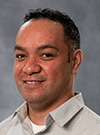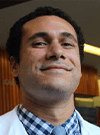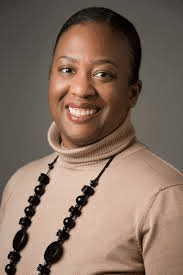Human Genetics Scholars
2024-2026 Human Genetics Scholars

Clinical Intern
University of Michigan
abramam@umich.edu
Amber M. Abram is a native Detroiter and master’s degree student in the Genetic Counseling and Public Health programs at the University of Michigan. Her research project investigates genetic counselors’ ability to provide comprehensive and equitable care to incarcerated patients. Amber hopes to use this work to improve health outcomes for incarcerated patient populations, who are statistically more likely to come from racially minoritized and medically underserved communities, and spark further conversations regarding incarcerated patient care. Prior to her graduate education, Amber earned her B.S in Biology with an Applied Genetics concentration and Leadership minor from the University of Detroit Mercy where she was presented with the Vivere ex Missione Award for her commitment to servant leadership within the Detroit community. Amber is a dedicated advocate and hopes to use her training and experiences to influence positive change for racially minoritized communities and academic trainees.

Associate Scientist
Lieber Institute for Brain Development
kj.benjamin90@gmail.com
Born and raised in a large extended family in Indianapolis, Indiana, Dr. Kynon Jade Benjamin is proud to be the first doctor in his family. He earned his GED with his mother’s support before attending Indiana University–Purdue University Indianapolis (IUPUI). At IUPUI, Dr. Benjamin began his scientific journey in a neuroscience research laboratory during his work study. His predoctoral studies focused on designing drug delivery and drug development assays, as well as developing bioinformatic pipelines for Angelman syndrome – a neurodevelopmental disorder. In his postdoctoral fellowship at the Lieber Institute for Brain Development and Johns Hopkins School of Medicine, he developed computational pipelines for large-scale transcriptional (bulk and single-cell), genetic, and functional analyses in postmortem brain and brain organoids. Dr. Benjamin’s research career highlights the critical need for diversity and inclusive spaces. He actively mentors and advocates for underrepresented minorities.

MD/ PhD Candidate
Case Western Reserve University
rod10@case.edu
Razaq Durodoye received his bachelor’s degree in Biochemistry from the University of Texas at Dallas and matriculated to Case’s MD/PhD program in 2019. He completed his pre-clerkship training in 2021 and is in his 4th year of the graduate phase in the Epidemiology and Biostatistics PhD program. His research working with Dr. Scott Williams focuses on understanding Alzheimer’s disease and other chronic conditions where he hopes to understand, address, and minimize health disparities, especially in minoritized populations.

MD/ PhD Student
Stanford University
tnfabo@stanford.edu
Tania Fabo is an MD-PhD student at Stanford University, pursuing her PhD in Genetics. She received her undergraduate degree in Human Developmental and Regenerative Biology from Harvard University in 2018, after which she pursued two separate master’s degrees at the University of Oxford as a Rhodes Scholar—first an MSc in Medical Anthropology, followed by an MSc by Research in Oncology. Her current PhD work explores diet-mediated gene-by-environment interactions in colorectal cancer, using a combination of high-throughput functional genomics tools and population-based studies. Tania’s ultimate goal is to become a professor who leads a lab exploring mechanistic biology and disease genetics and pathophysiology through a social and environmental lens. She is committed to advancing diversity and equity in science and medicine and wants to dedicate her career to helping minorities and those otherwise marginalized by society achieve their full potential.

PhD Candidate
University of Washington
gferra@uw.edu
Gabrielle Ferra is a PhD candidate in the Genome Sciences department at the University of Washington, working in the labs of Drs. Kelley Harris and Maitreya Dunham. She completed her undergraduate degree in Applied Mathematics-Biology from Brown University in 2020. At the University of Washington, she is conducting a deep mutational scan of the pharmacogene CYP2D6, which is responsible for the metabolism of approximately 25% of common drugs. Her research is driven by a keen interest in pharmacogenetics and precision medicine, aiming to improve healthcare outcomes for all. Outside of her research, Gabrielle is an avid CrossFit enthusiast and hiker, and she also enjoys playing the violin in her free time.

PhD Candidate
University of North Carolina at Chapel Hill
jflores@unc.edu
JP Flores is a PhD Candidate in Bioinformatics & Computational Biology at UNC Chapel Hill studying the role of 3D chromatin structure in response to environmental stress. He is the Founder and Host of the From where does it STEM? podcast where he interviews scientists from all over the world and asks how they got there. He was a Science Policy Intern in the NIH Office of Science Policy housed in the NIH Director’s Office in 2024 and is complementing his PhD at UNC by pursuing a Graduate Certificate in Innovation for the Public Good. Through this training, he hopes to innovate in both science and social justice efforts. He is an NSF GRFP Fellow and always down to be a resource for others, especially those from minoritized and marginalized backgrounds.

PhD Candidate
University of Chicago
reneefonseca@uchicago.edu
Renée Fonseca is a PhD candidate in the Department of Human Genetics at the University of Chicago, supported by a Ford Predoctoral Fellowship. Her research focuses on developing novel methods to improve polygenic score portability across populations to improve equity in disease risk prediction. Prior to attending UChicago, she was a Fulbright research grantee at the Universidad del Valle in Cali, Colombia, where she characterized disease burden in an Afro-Colombian population as part of a community-driven study. She holds a Master of Science in Bioinformatics and Computational Biology from the University of South Florida, an Artium Baccalaureus in Biology from Rollins College, and she is a certified Emergency Medical Technician. Long-term, she aims to build a research career leveraging genomics to advance health equity.

Postdoctoral Scholar
Case Western Reserve University
exv113@case.edu
Esteban Vazquez-Hidalgo is a Postdoctoral Scholar at Case Western Reserve University School of Medicine where he uses his multidisciplinary training in mathematical modeling, computational biology, genomics to study genetic variation impact on allele specific expression. Esteban earned his PhD in Computational Science from San Diego State University’s joint doctoral program with Claremont Graduate University. His dissertation had two aims: The first focused on developing mathematical and biophysical models to predict cardiac calcium concentrations. In his second aim, Esteban created a micro-scale biomechanical model that predicted how epithelial cells migrate by generating traction forces on their micro-environments. In addition to research, Esteban is an advocate for mentoring underrepresented students and developing strategies to support scientists of diverse backgrounds.
2023-2025 Human Genetics Scholars

PhD Student
Vanderbilt University Medical Center
kimberlyn.a.ellis@vanderbilt.edu
Kimberlyn A. Ellis is a Ph.D. student in the Training Program in Human Genetics at the Vanderbilt Genetics Institute. Her doctoral research investigates sex-by-ancestry interactions of asthma and environmental modifiers in African admixed populations. With this work, Kimberlyn hopes to dismantle health disparities and improve health outcomes for underrepresented populations. Prior to being a Ph.D. student, Kimberlyn received her Bachelor of Science in biology from Spelman College in 2019 and completed the NIH Postbaccalaureate Research Education Program at Brown University in 2020. In 2022, she completed the Christine Mirzayan Science and Technology Policy Fellowship with the National Academies of Sciences, Medicine, and Engineering and the Advocacy Certificate for Human Genetics and Genomics Trainees (ACGT) with the American Society of Human Genetics. In her free time, Kimberlyn enjoys reading, cooking, and spending time with her puppy and kitten.

Research Fellow
National Cancer Institute
oscar.florez-vargas@nih.gov
Oscar Florez-Vargas is a research fellow at the Laboratory of Translational Genomics (LTG) in the Division of Cancer Epidemiology & Genetics, National Cancer Institute, National Institutes of Health. He completed his undergraduate degrees in Microbiology and Medical Laboratory Sciences from the Industrial University of Santander in 2004 and his M.Sc. in Biochemistry from the National University of Colombia in 2008. In 2016, he earned his Ph.D. in Computer Science from the University of Manchester, UK. Before joining LTG, Dr. Florez-Vargas conducted extensive research on genetic associations with infectious diseases and toxicological exposures in Colombia. At LTG, he focuses on investigating multiple genomic regions associated with an increased risk of several cancers through genome-wide association studies. Through computational analysis, he explores genotype-phenotype relationships to assess the specific contributions of genomic regions, genes, and genetic variants to cancer phenotypes, under the mentorship of Dr. Prokunina-Olsson.

PhD Candidate
University of California, San Diego
jjauregu@ucsd.edu
Jeff Jaureguy is a Ph.D. candidate at the University of California San Diego, researching the functional impact of genetic variants in the non-coding region of the genome. His work at the Salk Institute for Biological Studies focuses on developing a Variant Aware neural network to understand rare variants’ effects on chromatin accessibility. A recipient of the prestigious Sloan scholarship, Jeff is grateful for the opportunities to grow as a research scientist. With a passion for academia, he aspires to become a professor specializing in machine learning algorithms for human genetic variation and gene regulation. Deeply committed to promoting diversity in STEM fields and creating equal opportunities, Jeff aims to make a significant impact in bioinformatics and systems biology through his research and dedication to equity in STEM.

PhD Candidate
Emory University
ronnieli0114@gmail.com
Ronnie Li is a PhD candidate in the Neuroscience graduate program at Emory University. He obtained his Bachelor of Science in Neuroscience from Brown University in 2015. Currently, Ronnie works with Dr. Zhaohui “Steve” Qin in the Rollins School of Public Health at Emory University, where he uses machine learning approaches to study expression quantitative trait loci (eQTLs) that are associated with gene expression across multiple somatic and brain tissues. Ronnie is passionate about advocating for individuals with disabilities in STEM, and he has given multiple lectures on his own journey to raise awareness and inspire others to pursue a career in STEM.

PhD Candidate
National Institutes of Health and the University of Cambridge
jam248@cam.ac.uk
Jasmine Mack, MPH, MS, is a PhD candidate training between the National Institute of Environmental Health Sciences and the University of Cambridge Department of Obstetrics and Gynecology in the NIH-Oxford-Cambridge Scholars Program. Jasmine earned a Masters in Biostatistics from the University of Michigan School of Public Health, a Masters in Public Health in Maternal and Child Health from Boston University School of Public Health, and a Bachelor’s of Science in Biology, Psychology, and Linguistics from Emory University. Jasmine’s research concerns multi-omics analysis of pregnancy complications and exploring efficient statistical methods for studying multi-ethnic and admixed populations. She is interested in studying how genetics and the environment influences cardiometabolic disorders of pregnancy, in addition to how maternal and fetal genetic effects affect pathogenesis. As a part of her commitment to service, Jasmine advocates for representation of historically excluded people as researchers as well as participants in research studies.

Postdoctoral Fellow
University of Pittsburgh
bcn6@pitt.edu
Dr. Bruce Nmezi is a postdoctoral researcher at the University of Pittsburgh Graduate School of Public Health, Department of Human Genetics, where he obtained his Ph.D. in 2019. His research involves the study of the nucleoskeletal protein known as lamin B1, the overexpression of which leads to a fatal demyelinating disorder known as autosomal dominant leukodystrophy. He currently utilizes cutting-edge molecular biology, CRISPR, and bioinformatics techniques to uncover novel genomic silencer elements that confer tissue-specific regulation of lamin B1. Along with his main research focus, Dr. Nmezi volunteers at the Carnegie Museum of Natural History and judges at the annual Pittsburgh Regional Science and Engineering Fair at the Carnegie Science Center. He advocates for mentoring students from underrepresented minority groups and promoting their interest in STEM fields.

PhD Student
Meharry Medical College
apigg21@email.mmc.edu
Alexis is an avid Ph.D. student at Meharry Medical College in Nashville, TN. She earned her B.S. degree in Animal Science from The University of Tennessee, Knoxville, and M.S. degree from Tennessee State University where her research focus was in poultry science. Currently, her dissertation project investigates genetic pleiotropy across hypertension and women’s gynecologic diseases, with aims to elucidate disparities in risk and outcomes. Alexis possesses a diverse teaching background and has a strong passion for teaching, mentorship, and research. She was awarded the “Excellence in Leadership” award from Meharry for her contributions on the Graduate Student Association’s executive board. After securing her Ph.D., Alexis desires to be a professor, to continue to engage in research and teaching.

PhD Candidate
Brigham Young University
kjustina_tavana@byu.edu
Justina P. Tavana is a PhD candidate in the Biology graduate program at Brigham Young University (BYU). Originally from Samoa, she received a Bachelor of Science degree from Brigham Young University-Hawaii in Biology. Currently, Justina works with Dr. Keoni Kauwe at BYU, where her research focuses on identifying genetic risk factors associated with Alzheimer’s disease (AD) in Native Hawaiian and Pacific Islander populations. Justina’s work aims to identify genetic mechanisms that drive the pathology and etiology of AD among these underrepresented communities. She also strives to ultimately improve diagnosis and treatment efforts for this devastating disease. Justina is actively involved in community outreach and mentoring programs. Her passion lies in advocating for health equity and in inspiring and nurturing the next generation of scientists.
2022-2024 Human Genetics Scholars

PhD Candidate
Emory University
kdiazpe@emory.edu
Kimberly Diaz Perez is a PhD candidate in the Genetics & Molecular Biology graduate program at Emory University. She obtained her Bachelor of Science in Biology from Georgia State University. Currently, Kimberly works with Dr. Elizabeth Leslie at Emory University, where her research focuses on exploring the role of rare genetic variants associated with orofacial clefts using whole-exome and whole-genome sequencing. As a Howard Hughes Medical Institute (HHMI) Gilliam fellow, she is an active advocate for diversity and inclusion in STEM, primarily focusing on increasing awareness about accessibility for individuals with disabilities in academia.

PhD Candidate
University of Utah
u1247633@utah.edu
Paige Haffener is a PhD Candidate in the Leffler Lab at the University of Utah. Originally from Oklahoma, she received a Bachelor of Science from Oklahoma City University in cell and molecular biology. In graduate school, Paige has transitioned into the field of population genomics. Her thesis work uses population genetic and genomic techniques to study the effects of admixture and selection on malaria susceptibility in human and non-human primate populations. In addition to research, she has taken a strong interest in science outreach programs that focus on building the interest and awareness of STEM careers for students from underrepresented groups in K-12 schools.

PhD Candidate
Vanderbilt University
gabrielle.hampton@vanderbilt.edu
Gabrielle Hampton obtained a Bachelor of Science degree from Belmont University, a Master of Science from Lipscomb University, and she is currently pursuing a Doctoral degree from Vanderbilt University. Gabrielle’s current research interests include understanding chronic health disparities in individuals of African descent. Under the mentorship of Dr. Todd Edwards, her thesis work uses computational and statistical genetic approaches to identify and use shared genetic architecture to increase the utility of risk prediction models in diverse populations.

MD/PhD Candidate
Albert Einstein College of Medicine
eric.sosa@einsteinmed.edu
Eric Sosa is a Salvadoran-American from South Central Los Angeles. His mother moved to California to flee the political corruption of post-civil war El Salvador. At an early age Eric began working to financially assist his mother, whose health issues hindered her. He attended public schools where funding was low, and courses were overcrowded. Despite these odds, Eric graduated and was admitted to UCLA. Eric majored in Human Biology & Society, where he focused on the intertwining of disease and social determinants. Eric graduated in 2017 with highest departmental honors. In 2018, Eric matriculated at the Albert Einstein College of Medicine in the Bronx. He has begun his PhD training in Dr. John Greally’s lab; studying the role of non-coding variants in GABAergic neuron differentiation as a model for autism. Eric’s diverse learning experiences, at home and in the Bronx, has reinforced his commitment to research, and helping the underserved.

PhD Candidate
University of Chicago
lizethtamayo@uchicago.edu
Lizeth Tamayo is a Ph.D. candidate in genetic epidemiology at the University of Chicago. She completed her undergraduate studies at Augustana College in Biochemistry and French and her Master of Public Health with a concentration in Epidemiology from the University of Illinois at Chicago School of Public Health. Her current research broadly focuses on the interplay between genetic and environmental factors and their impact on complex disease risk in low-resource and understudied populations. More specifically, she developed a dissertation project that bridges multiple aspects of methodological training related to genome-wide association studies, gene-environment interactions, and the implementation of a public health intervention of returning genetic results. She has also worked to understand specific molecular characteristics of breast cancer in Peruvian women with high Indigenous Ancestry. Outside of the lab, Lizeth enjoys reading, spending time with her family and friends, and rating French fries throughout the city.

Postdoctoral Fellow
University of Michigan
adelaidetovar@gmail.com
Dr. Adelaide Tovar is a postdoctoral fellow at the University of Michigan where she uses multidisciplinary expertise in quantitative genetics, bioinformatics, and functional genomics to study the effects of genetic variation on transcriptional regulation and diabetes risk. In 2021, she earned her PhD in Genetics & Molecular Biology from the University of North Carolina at Chapel Hill. For her graduate research, she employed genetic and genomic approaches in a large, genetically diverse mouse population to discover gene-environment interactions with air pollution. Dr. Tovar is currently leading an effort to characterize regulatory activity across all known type 2 diabetes-associated variants as part of the Accelerating Medicines Partnership for Common Metabolic Diseases consortium and is a Burroughs Wellcome Fund Postdoctoral Diversity Enrichment Program Fellow (2022-2025).

PhD Candidate
University of Utah
travis.tuifua@utah.edu
Travis Tu’ifua is a PhD candidate in the department of human genetics at the University of Utah. His thesis work is in functionally characterizing genetic modifiers of a rare congenital disorder of deglycosylation called NGLY1 deficiency. He has a passion for equity, diversity, and inclusion (EDI) work and serves in his PhD program’s EDI Task Force and his department’s EDI committee. Travis received his bachelor’s degree in Biomedical Engineering at the University of Utah. He is the father of three young girls and is married to the love of his life.

MSTP Student
Albert Einstein College of Medicine
matanel.yheskel@einsteinmed.edu
Matanel Yheskel graduated from the University of Texas at Austin with a degree in Biochemistry. He then was a technician at UT Southwestern Medical Center in the laboratory of Dr. Vishal Patel where he studied the role of microRNAs in Autosomal Dominant Polycystic Kidney Disease. He is currently pursuing his MD/PhD at Albert Einstein College of Medicine. He is performing his thesis research laboratory of Dr. Julie Secombe where he is studying how intellectual disability associated missense variants in histone demethylase KDM5C affect its function using Drosophila melanogaster as a model.
Alumni Scholars

Assistant Professor
California State University Northridge
eduardo.amorim@csun.edu
Dr. Eduardo Amorim is an Assistant Professor of Biology at Cal State Northridge. His research focuses on leveraging genetic diversity from present-day and ancient human individuals to learn about population history, adaptation, and disease. Dr. Amorim’s academic background includes postdoctoral training at Columbia University, Stony Brook University, UCLA, and the University of Lausanne, and a Ph.D. from the Federal University of Rio Grande do Sul, Brazil. His current research centers on developing approaches to characterize natural selection in humans using ancient DNA. Dr. Amorim is an advocate for diversity and inclusion in STEM and has worked for promoting the visibility of underrepresented scholars and individuals from historically marginalized groups.

PhD Candidate
Meharry Medical College
kactkins17@email.mmc.edu
Ky’Era Actkins obtained her Bachelor of Science in Biology at the University of Alabama and is currently a Doctoral Candidate at Meharry Medical College where her research interests include understanding health disparities in women’s health conditions. Under the mentorship of Dr. Lea Davis at Vanderbilt University Medical Center, her thesis work uses computational and statistical genetic methods to characterize genetic and environmental risk factors of polycystic ovary syndrome in diverse populations. Ky’Era is also a recipient of the Ruth L. Kirschstein Pre-Doctoral National Research Service Award.

Postdoctoral Fellow
NCI
lesley.chapman@nih.gov
Dr. Lesley Chapman Hannah is a postdoctoral fellow at the National Cancer Institute. She obtained her Ph.D. from the University of Rochester Medical Center where she studied the effects of microRNAs on mediating the host immune response. Dr. Chapman Hannah is currently leading an effort to identify rare non-coding variants that are associated with cancer risk in a cohort of childhood cancer survivors using machine learning based strategies. She is a fellow within the NCI Intramural Continuing Umbrella of Research Experiences (iCURE) Program, and is actively involved in the mentorship of underrepresented minorities within cancer research.

Doctoral Candidate
Howard University
gretchj@gmail.com
Gretchen Johnson is a PhD candidate in Biology at Howard University. Her dissertation investigates the genomic origins and diversity in the human skeletal remains of mid-19th century Liberated Africans, a forgotten population of the transatlantic slave trade discovered on remote St. Helena Island. Gretchen conducted a six-month field research on St. Helena for her dissertation. During her fieldwork, she stimulated an island-wide interest in genetics and ancient DNA research among the diverse St. Helenian population, and created interdisciplinary research opportunities for St. Helena’s School System. As a National Geographic Explorer, Gretchen was selected as a National Geographic Early Career Leader, and AAUW Fellow based on her pioneering field research work on St. Helena. Gretchen earned her Master of Science degrees in Biomedical Forensic Science, and in Medical Science from Boston University School of Medicine; Bachelor of Science degree in Biology from Rensselaer Polytechnic Institute.

Research Associate
University of Pittsburgh
juan.deltoro@pitt.edu
Dr. Juan Del Toro is a Research Associate at the Learning Research and Development Center at the University of Pittsburgh. Dr. Del Toro received his Ph.D. in Developmental Psychology with a concentration in Advanced Quantitative Analyses from New York University. As an applied psychologist, Dr. Del Toro takes a multi-method, multidisciplinary, and collaborative approach to investigate: (1) why distinguishing between perpetrators of racial discrimination matters for child development, (2) what are the direct and intergenerational consequences of involvement in the criminal justice system, and (3) what are opportunities that peers, educators, and families can leverage to reduce the negative effects of unwarranted involvement in the criminal justice system on children’s developmental competencies. This work has resulted in first-authored publications in Child Development, American Psychologist, and Proceedings of the National Academies of Sciences (PNAS) and has garnered support from the National Institutes of Health and the Spencer Foundation.

Research Fellow
Massachusetts General Hospital/Harvard Medical School
ricardo.harripaul@gmail.com
Dr. Ricardo Harripaul is currently a research fellow at Massachusetts General Hospital/Harvard Medical School and combines multidisciplinary training in bioinformatics and human genetics to identify and characterize novel genes in neurological disorders. His thesis work at the University of Toronto identified the role autosomal recessive variants play in neurodevelopmental disorders including Autism Spectrum Disorders, Intellectual Disability and Bipolar Disorder. Dr. Harripaul has identified over 40 novel genes for ID and contributed to the discovery of Inborn Errors of Metabolism in hard-to-treat psychiatric patients. Dr. Harripaul is currently investigating how splicing defects affect expression in neurological disorders. He is also very passionate about teaching and has taught many workshops on computational biology to general and graduate-level audiences. Dr. Harripaul is an advocate for teaching disadvantaged populations and has also taught special needs children at Grandview Children’s Centre for over a decade.

MD/PhD Student
Harvard Medical School
nathan_nakatsuka@hms.harvard.edu
Nathan Nakatsuka (kānaka maoli) was born and raised in Honolulu, Hawaii. He graduated from Kamehameha Schools Kapālama High School then attended Harvard College, earning an AB in Chemical and Physical Biology. He then attained an MPhil in Genetics from University of Cambridge on a Gates Cambridge scholarship, working at the Wellcome Trust Sanger Institute with Inês Barroso. Nathan is currently an MD/PhD student at Harvard Medical School in the Harvard-MIT Health, Sciences, and Technology MD track. He received his PhD from the Systems, Synthetic, and Quantitative Biology PhD program working in the laboratory of David Reich on population genetics of South Asia and the Americas with relevance for human health.

Postdoctoral Fellow
NHGRI/NIH
calandra.whitted@nih.gov
Dr. Calandra Whitted is a postdoctoral fellow at the National Human Genome Research Institute in the Social and Behavioral Research Branch. She obtained a Doctor of Public Health degree in Behavioral Sciences and Health Education from Florida Agricultural and Mechanical University, College of Pharmacy and Pharmaceutical Sciences, Institute of Public Health and the National Institutes of Health Graduate Partnership Program where her dissertation focused on health disparities in genomics education. Dr. Whitted performs research in the field of social and behavioral genomics. She is currently leading a project to help Black individuals and families understand how to assess risk of heritable diseases using family health history tools with the aim of improving communication and generational family health. She is an advocate for mentoring underrepresented students and developing strategies to support scientists of diverse backgrounds.

Assistant Professor
Grambling State University
harrisja@gram.edu
Dr. Jacqueline Harris is currently an Assistant Professor of Chemistry and has multidisciplinary training in biostatistics and biochemistry. Her academic background includes post-doctoral training in statistical genetics at The University of Alabama at Birmingham (UAB) in the Department of Biostatistics Section on Statistical Genetics. She received her PhD in Chemistry from the University of Mississippi. Dr. Harris has received formal and practical training in statistics and statistical genetics. She has published in the following areas: statistical modeling of health disparities, and genetic network discovery in the Hap Map data set. Dr. Harris’ research aims to contribute to the understanding of underlying genetic and environmental factors that contribute to metabolic disease and health disparities.

Graduate Research Fellow
Pennsylvania State University, Bioinformatics and Genomics
jmh791@psu.edu
Jordan Hughey is a Bioinformatics and Genomics PhD Candidate under Dr. Dajiang Liu at Penn State. His thesis work focuses on developing computational approaches that integrate multi-omic data to elucidate mechanisms behind complex traits. Furthermore, Jordan performed experimental research developing and testing DNA sequencing technologies during his undergraduate at the University of California, Santa Cruz. As a graduate fellow, he has been awarded the National Science Foundation Graduate Research Fellowship and Alfred P. Sloan Foundation Minority PhD Scholarship. Being a member of many STEM diversity groups, Jordan is a passionate advocate for increasing diversity and inclusion in STEM higher education.

Intramural Research Training Award Postdoctoral Fellow
National Human Genome Research Institute
deyana.lewis@nih.gov
Dr. Deyana Lewis is a postdoctoral fellow at the National Human Genome Research Institute. She obtained a PhD from the University of Pittsburgh Graduate School of Public Health where her dissertation focused on health disparities in dental genetics. Dr. Lewis performs research in the field of genetic epidemiology/statistical genetics. She is currently leading analyses of whole exome and genome sequencing of African American men with hereditary prostate cancer from the African American Hereditary Prostate Cancer (AAHPC) study with the aim to identify causal genes and high-risk variants. She is also an advocate for mentoring underrepresented minority students in STEM.

Postdoctoral Fellow
Emory University, Department of Human Genetics
trenell.mosley@emory.edu
Trenell Mosley received her Doctoral Degree at Emory University. She obtained her Bachelor’s in Science in Human Biology from The University of Texas at Austin. She currently works under Dr. Michael Zwick and Dr. Jennifer Mulle, and her thesis work is aimed at understanding the contributions of genetic and genomic variation to rare genetic disorders. Specifically, she focuses on the influence of genomic architecture in the formation of recurrent copy number variants. She also works extensively within the university to aid and advocate for diversity support and inclusion on campus and, more broadly, in STEM higher education and the workforce.

Postdoctoral Research Scientist
Columbia University, Institute for Genomic Medicine
tdp2117@cumc.columbia.edu
Dr. Tess Pottinger is a Postdoctoral Research Scientist at the Institute for Genomic Medicine at Columbia University where she performs research in the field of statistical genetics. Her current project includes optimizing rare variant analysis techniques through machine learning across various disease phenotypes using whole exome and whole genome data. She obtained a Ph.D. in Biomedical Informatics with a focus in Human Genetics from Northwestern University where she performed research in uncovering rare and common variation underlying heart failure using longitudinal phenotyping in a medical biobank.

Postdoctoral Fellow
University of Louisville School of Medicine, Department of Biochemistry and Molecular Genetics
oscar.rodriguez.1@louisville.edu
Oscar Rodriguez is a Postdoctoral Fellow at the University of Louisville School of Medicine and was recently awarded The Zuckerman Postdoctoral Scholar Fellowship. He received his PhD from the Icahn School of Medicine at Mount Sinai in the Department of Genetics and Genomic Sciences under the supervision of Dr. Andrew Sharp and Dr. Ali Bashir. His research focuses on resolving complex regions of the human genome and structural variants with a particular focus on tandem repeats and the immunoglobulin heavy chain locus. He received his B.Sc. in Biomedical Science with a focus on Bioinformatics from the NYU Tandon School of Engineering.

Assistant Professor
The University of Chicago
lsaulsberry@uchicago.edu
Dr. Loren Saulsberry is an Assistant Professor in Health Policy and Health Services Research in the Department of Public Health Sciences at The University of Chicago. Her research program aims to evaluate and guide the implementation of pharmacogenomics (PGx) into clinical practice in a manner that advances health equity within genomic medicine. She has studied the diffusion and uptake of emerging medical technologies to treat chronic diseases with a particular focus on how health innovations impact health disparities. Dr. Saulsberry received her Ph.D. in Health Policy from Harvard University and is an alumna of the Dana Farber/Harvard Cancer Center’s Training in Oncology Population Sciences Program. Before entering academia, her prior experiences include cancer genetics research and working with the Kaiser Family Foundation.

Graduate Research Associate
The University of Arizona, Department of Epidemiology and Biostatistics
mtrejo@arizona.edu
Mario Trejo is completing a PhD in Epidemiology at the University of Arizona. His dissertation involves analyzing clinical trial genomic data to examine the association between genetic variation and colorectal adenoma recurrence. During his MPH program, Mario was a CEESP fellow in Zambia where he studied HIV’s relation to cervical cancer progression. Mario, originally from South Central Los Angeles, earned his bachelor’s degree from the University of California, Merced prior to his service with the Peace Corps in El Salvador. Mario has experience working with populations locally and abroad including Zambia, El Salvador, and along the U.S. Mexico border.

Assistant Professor
Department of Psychiatry
College of Medicine
University of Florida
giustirodriguezp@ufl.edu
Dr. Paola Giusti-Rodríguez is currently an Assistant Professor at the University of Florida. She previously held a position as a Research Assistant Professor in the Department of Genetics at the University of North Carolina at Chapel Hill. Paola grew up in San Juan, Puerto Rico, where she completed her undergraduate studies at the University of Puerto Rico. Paola has a Ph.D. from Harvard University, where her dissertation focused on the molecular basis of neurodegeneration. Her postdoctoral work was done at UNC, studying antipsychotic pharmacogenomics. Paola is applying functional genomics to gain mechanistic insight onto psychiatric disorders as part of a K01 award. She is committed to the diversification of psychiatric genomics studies through collaborations.

Genomic Medicine Fellow
Harvard Medical School/ Harvard School of Public Health/BWH/DFCI
latrice_landry@hms.harvard.edu
Latrice Landry is a Fellow specializing in precision medicine and health disparities at Harvard Medical School, Brigham and Women’s Hospital, Dana Farber Cancer Institute and Harvard School of Public Health. As the Inaugural Food and Drug Administration’s Genomic Medicine and Minority Health Fellow, she was recognized as a thought leader in minority health and precision medicine by the National Minority Quality Forum and as a top 10 under 40 rising stars by Genetic Engineering and Biotechnology. She is helping lead equity and disparities research in the field of precision medicine.

Lead Statistical Geneticist
Goldfinch Bio
candace.middlebrooks@nih.gov
Dr. Candace Middlebrooks currently works at Goldfinch Bio as the Lead Statistical Geneticist. She previously held a position as a Research Fellow at the National Human Genome Research Institute. Candace obtained a Ph.D. in Genetics and Molecular Biology at Emory University where she performed research in the field of genetic epidemiology. Dr. Middlebrooks performs research in the field of translational genetic epidemiology/statistical genetics. Her current research includes a whole genome sequencing study of leg ulcers in individuals with Sickle Cell Disease from the Insights study as well as a study to determine whether individuals from families with hereditary cancer syndromes are at risk of other cancers.

Assistant Professor
University of Southern California
mortond@usc.edu
Derrick Morton’s main research objective is to understand key developmental pathways and how alterations in gene expression contribute to neurological disease. His current studies specifically exploit a Drosophila melanogaster model to examine RNA exosome-linked disease. The RNA exosome is an evolutionary-conserved riboexonuclease complex critically important for both precise processing and complete degradation of a variety of cellular RNAs. By testing the hypothesis that defects in assembly and interactions of the RNA exosome contribute to neurologic disease, we will further our knowledge of RNA exosome-linked disease and also provide invaluable insights into distinct tissue-specific consequences due to altered subunits within RNA exosome.

Graduate Research Fellow
UCLA
crrobles@cs.ucla.edu
Christopher Robles is a PhD Candidate at UCLA working on developing computational and statistical methods to draw conclusions from large genomic datasets under Dr. Sriram Sankararaman. His thesis work focuses on ancient DNA, specifically how Neanderthal introgression affects modern human biology. He is also an advocate for increasing diversity in STEM higher education. Chris grew up in Los Angeles and after attending community college, earned his bachelor’s degree in Bioengineering at UC Santa Cruz.

Associate Professor of Genetics, Genomics and Informatics
University of Tennessee Health Science Center
astarlar@uthsc.edu
Dr. Athena Starlard-Davenport is a molecular biologist dedicating her research efforts toward investigating molecular mechanisms involved in breast cancer disparities and sickle cell disease. Dr. Starlard-Davenport has over 10 years of research training in breast cancer biology and genetics. She received her MS degree in Biology with a research focus in agricultural microbiology from the University of Louisiana. After being the first African American to receive her PhD in Biochemistry and Molecular Biology from the University of Arkansas for Medical Sciences (UAMS) she completed postdoctoral training in the Division of Biochemical Toxicology at the FDA National Center for Toxicological Research, and in the Department of Medical Genetics and Cancer Control and Population Sciences at the UAMS.

Senior Genetic Epidemiologist
Nuffield Department of Population Health, University of Oxford
jmtorres@well.ox.ac.uk
Jason Torres is a senior genetic epidemiologist in the Nuffield Department of Population Health at the University of Oxford, where he leads genetic analyses of the Mexico City Prospective Study. He has a longstanding interest in identifying genetic risk factors for metabolic disease among populations of non-European ancestry. Through analyses of large-scale genomic data, Jason elucidates underlying biological processes that mediate susceptibility to disease onset and progression. Jason received his PhD at the University of Chicago and previously worked at the Wellcome Centre for Human Genetics where he resolved causal genes and tissues at loci associated with type 2 diabetes.

Doctoral Researcher
Vanderbilt University
krystal.s.tsosie@vanderbilt.edu
Krystal Tsosie (Diné/Navajo), MPH, MA, is currently completing an interdisciplinary PhD in Genomics and Health Disparities at Vanderbilt University. She also serves as research faculty at a tribal college and co-leads genomic studies related to women’s health in a tribal community in North Dakota. Krystal advocates strongly for genomic and data sovereignty and is a co-founder of the first Indigenous-led biobank for tribes in South Dakota. She has expertise in population genetics, CELSI (Cultural, Ethical, Legal, and Social Issues), and Indigenous data sovereignty to the Strong Heart Study, Stanford University, and the University of Oklahoma.
